By a margin of 44 votes, Kathy Litton broke a 53-year stretch of men holding a key Southern Baptist Convention position.
“To me it said we’re welcoming women to be leaders in the denomination,” said Litton, reflecting on her election to registration secretary at the 2019 SBC annual meeting. “There certainly was tremendous symbolism in the fact these convention offices had always been dominated by males.”
Litton and at least five other women were the first-ever elected to high-level convention office or leadership among trustees for SBC-affiliated agencies, called entities, since 2018. That year, a series of scandals involving prominent Southern Baptist men sparked a moment of reckoning within the nation’s largest Protestant denomination over its treatment of women.
Starting in 2018 and amid continued adherence to complementarianism — referring to a belief that men and women have certain assigned roles — SBC leaders expressed more support for women in convention leadership, including even its president. That led to moments such as Litton’s election and at the same meeting, Litton and other women launching the Women’s Leadership Network. The initiative sought to encourage women to apply their leadership experience within local congregations to the national denominational level.
“It was a breath of fresh air for some women thinking, ‘We can be recognized as leaders beyond our local church experience,’” said Litton, currently a director employed at the SBC-affiliated North American Mission Board. “The whole thing was long overdue.”
But that groundswell of empowerment has also sparked a rising backlash that has left many women questioning their place in the church as the denomination struggles to balance traditional gender beliefs and a growing push for women in leadership.
In the past couple years, the Nashville-based SBC disfellowshipped six churches in which women serve as pastors and a proposed measure to enshrine a ban on women pastors received initial approval. That measure will come before delegates, called messengers, for a second and final approval at the upcoming SBC annual meeting in Indianapolis on June 11-12.
But this campaign against women pastors emerged from a deeper anxiety among some Southern Baptists. Rhetoric against women’s influence in the SBC has pushed out leading voices such as popular author Beth Moore and disincentivized other Southern Baptist women to speak up.
Some of those same women remain optimistic about the future of women’s participation in Southern Baptist life. But the 180-degree turn in the past six years has also laid bare the volatile state of the politics of women in the SBC.
“They are simply doing exactly what I expected them to do,” said Susan Shaw, an Oregon State University gender studies professor and author of “God Speaks to Us, Too: Southern Baptist Women on Church, Home, and Society.”
A former Southern Baptist herself and still a frequent commentator on SBC news, Shaw said the pendulum swing is part of a cyclical pattern in the denomination.
The denomination previously fought over women’s ordination in the 1980s following an uptick in female enrollment at Southern Baptist seminaries. Shaw said an example of the pushback to women in ministry was a 1984 resolution that said, “God requires the man was first in creation and the woman was first in the Edenic fall.”
Some moderate Southern Baptists at the time publicly defended women, which Shaw said was a way they distinguished themselves from the fundamentalists. Many of those moderates eventually left the SBC for the Cooperative Baptist Fellowship, established in 1991. Both the support for women and the subsequent backlash is part of the cycle in the SBC repeating itself today, Shaw said.
“They (Southern Baptists) have turned on each other and women are pawns in that,” she said. “It’s always on the men’s terms where women fit in.”
Relevant and more recent: What state-level ousters of SBC churches say about the national debate about women pastors
The path to elevate women begins
In the same year Litton won her election as registration secretary and helped start the Women’s Leadership Network, author Mary DeMuth felt a similar determination and confidence over the future of women in the SBC.
Following her advocacy for abuse reform and release of her book, “We Too: How the Church Can Respond Redemptively to the Sexual Abuse Crisis,” DeMuth addressed the convention from the stage of the 2019 SBC annual meeting and then during a panel at the Ethics & Religious Liberty Commission-sponsored Caring Well Conference.
“I was hopeful that because I was being listened to and dignified, I felt things were going to change,” DeMuth said in an interview. But looking back, DeMuth said that year was also when forces which sought to halt that progress began to emerge.
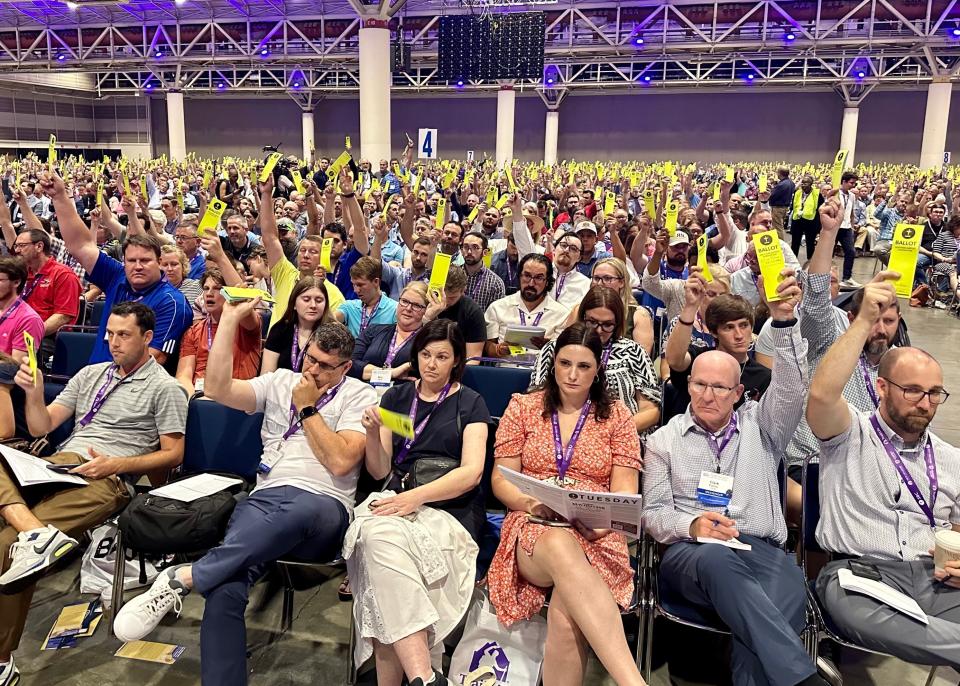
It all started in early 2018 amid the #MeToo and #ChurchToo movements when Tennessee pastor Andy Savage publicly confessed to sexual abuse, SBC Executive Committee chief executive Frank Page suspiciously resigned, and Southwestern Baptist Theological Seminary fired president Paige Patterson over reports of Patterson intimidating abuse victims and demeaning women in a sermon.
In a shocking rebuke, then-SBC President Steve Gaines denounced Patterson’s misogyny and apologized to women in the SBC.
Then, during the 2018 SBC annual meeting, the Ethics & Religious Liberty Commission announced new initiatives for women, and a new ministry called Women & Work held its inaugural panel — in addition to other panels and a rally featuring women speakers.
Former SBC President James Merritt also showed support for a woman becoming SBC president, an idea that Texas pastor Dwight McKissic helped popularize in a column titled, “The case for electing Beth Moore as president of the Southern Baptist Convention.”
But talk of a woman president also stirred a resistance. Al Mohler, president of Southern Baptist Theological Seminary, expressed support for women but also pushed for traditional gender norms in a column. A leader of the opposition conservative faction in the SBC, which has sought to pull the convention further to the right, cited Mohler’s reflections in a more direct rebuke against a woman SBC president.
“The move toward empowering women to fulfill their calling is a worthy movement for the churches of the SBC to support — so long as it’s helping women fulfill God’s original design for them,” Josh Buice, president of the Reformed Baptist nonprofit G3 Ministries, wrote in a column on the G3 website. That protest escalated in early 2019 when Moore spoke at a church on Mother’s Day, sparking outrage among opposition conservatives who claimed Moore was preaching.
Leaders of the same faction then led a successful countermeasure at the 2019 SBC annual meeting against the proposed appointment of Susan Codone, a university professor and advocate for abuse reform, to a committee that evaluates churches reported for wrongdoing. To DeMuth, who shared many of the same stages with Codone in those early years, moments such as that were early signs of a relentless struggle.
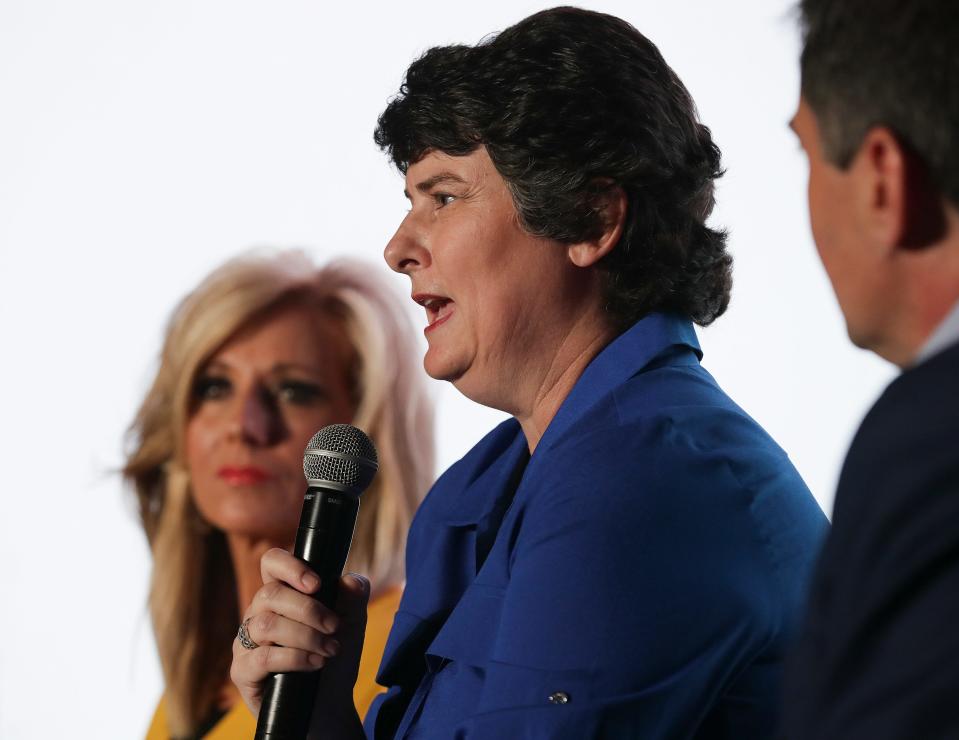
“It’s very disempowering to have gatekeepers gatekeep something that the Lord has put in your life and in your heart,” DeMuth said. Her experience was one of “learned helplessness,” which DeMuth said is when someone gives up after repeated attempts with the same outcome.
“In 2019 and 2020, my learned helplessness was against the institution of the SBC,” DeMuth said. “It’s large and I’m little.”
Recent SBC abuse-related news: Second SBC pastor implicated in ‘conspiracy’ to destroy evidence in federal abuse inquiry
The path to elevate women rises and falls
Contrary to DeMuth’s trajectory from 2019 onward, other women were ascending to new heights in the SBC.
Women were elected as chairs of entity trustee boards for GuideStone Financial Resources, the publisher Lifeway, the Ethics & Religious Liberty Commission and the North American Mission Board, and for the SBC nominations committee.
It didn’t necessarily feel groundbreaking to women like Erin Bounds.
“I wasn’t out trying to make a name for myself of a platform,” said Bounds, the former trustees chair of the North American Mission Board. “For me, it was a natural progression of my time at NAMB.”
Litton attributes some of the change to a more expansive view of qualifications for leadership roles in the denomination, a category historically reserved for male senior pastors.
Meanwhile, enthusiasm for women in ministry has grown at Southern Baptist seminaries. The six SBC-affiliated seminaries introduced new academic and extracurricular programs tailored toward women, including master and doctorate degree programs for ministry to women, a first-of-its-kind class on biblical exposition for women, and local Society for Women in Scholarship chapters.
Cumulative female enrollment across five of those six seminaries increased by 30% between 2018-2022, according to an analysis of fall enrollment for full-time graduate students reported by the Integrated Postsecondary Education Data System.
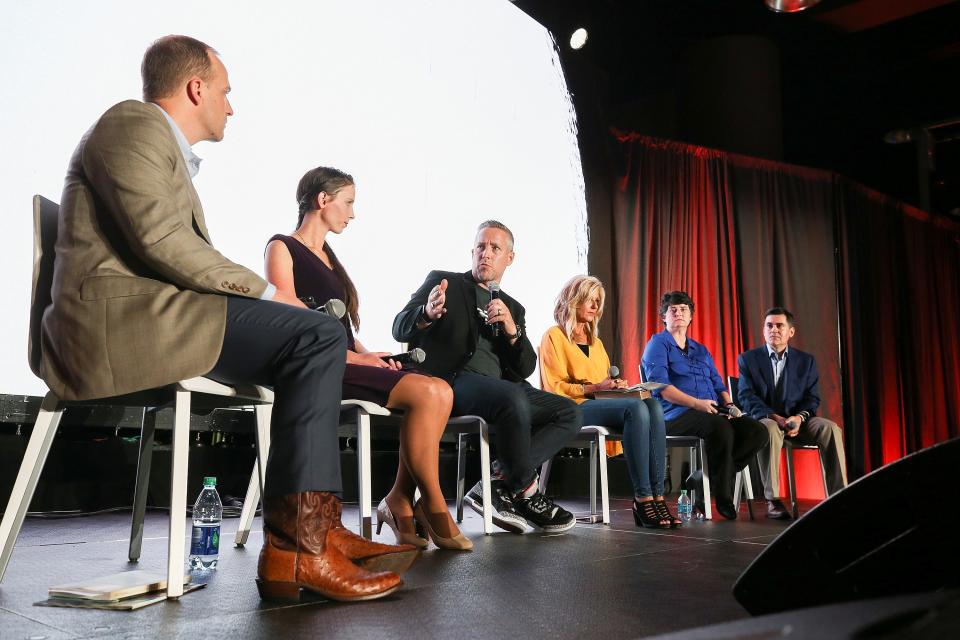
The number of full-time employees who are women at four of the six seminaries has slightly increased in that same time. The number of total women employed at the International Mission Board and GuideStone Financial Resources increased, so did the percentage of total employees who are women at the Ethics & Religious Liberty Commission, Lifeway and the North American Mission Board, according to figures provided by those entities.
But these measurable gains fail to capture certain lived experiences and might even mislead others to think the climate is better than it is, explained author and scholar Karen Swallow Prior. A higher stature or an official title doesn’t insulate a woman from disapproval.
“The SBC is the place where women leaders are actively sought and supported as tokens,” Prior said. “And women who check all of the doctrinal boxes won’t be supported, I’ve found, if there are unspoken rules that are crossed.”
Prior, a prominent voice in evangelical Christian spaces, experienced that dynamic personally, ultimately causing her to withdraw from SBC institutional life. To the surprise of many, Prior announced in March 2023 she was resigning from Southeastern Baptist Theological Seminary in Wake Forrest, North Carolina, where she taught English and Christianity & culture. Citing the “the politics of institution life in the SBC,” Prior’s resignation followed a controversy promoted by an influential opposition conservative leader and repeated attacks on social media.
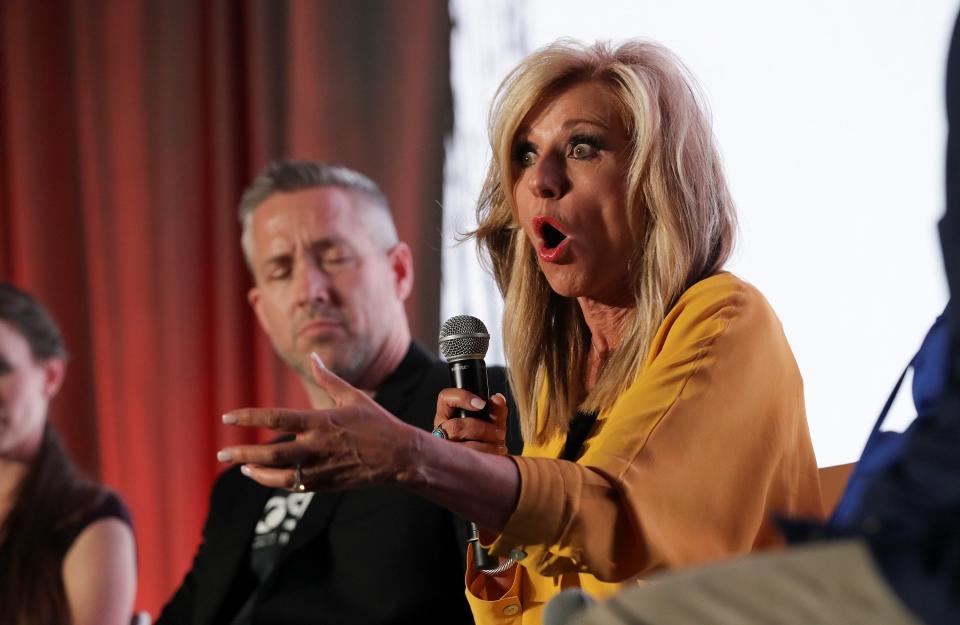
Prior’s announcement echoed that of Moore two years earlier, a dramatic moment considering Moore’s prestige in the SBC. In fact, Prior saw that news at the time as a potential wake-up call, not a bellwether of her own fate.
“Because I was naïve and overly hopeful, I saw that as a possible turning point where enough good people in the SBC would look at that loss and say, ‘Wow, we have to fix something,’” Prior said. “Obviously, that’s not what happened.”
The path to elevate women restarts
Instead of inspiring further introspection, Prior said Moore’s departure emboldened those who saw the world-renowned Bible study teacher as a threat to their authority.
“It’s one thing to put a face at the table,” Prior said. “It’s another thing to accept and accommodate an entire person and the body of experiences and her understanding of the world into how you do business every day.”
Within months of Moore leaving the SBC, opposition conservatives led the first push in an ultimately successful campaign against churches with women pastors.
What started as a fringe idea later permeated into the mainstream when the convention voted overwhelmingly at the 2023 SBC annual meeting to uphold the ouster of Saddleback Church in Southern California and Fern Creek Baptist Church in Louisville. That set a precedent for similar actions at the state level and another ouster in February.
Ahead of this year’s SBC annual meeting in Indianapolis, a Virginia church announced it will be the target of an ouster attempt from the floor because the church employs a woman pastor for children and women.
Meanwhile, the battle over the proposed measure to enshrine a ban on women pastors — commonly called the “Law Amendment,” bearing the namesake of its initial submitter, Virginia pastor Mike Law — has shifted the focus of the conversation from the status of women in ministry to the merit of Southern Baptists’ commitment to complementarianism. Even opponents of the measure are spending more time defending against claims that their stance is synonymous with liberal views on gender roles.
The tone of the conversation about women in the SBC today versus six years ago is radically different. Christianity Today reported last year part of that change is rooted in a narrowing theological view of complementarianism.
But Shaw said there’s also a purely political element.
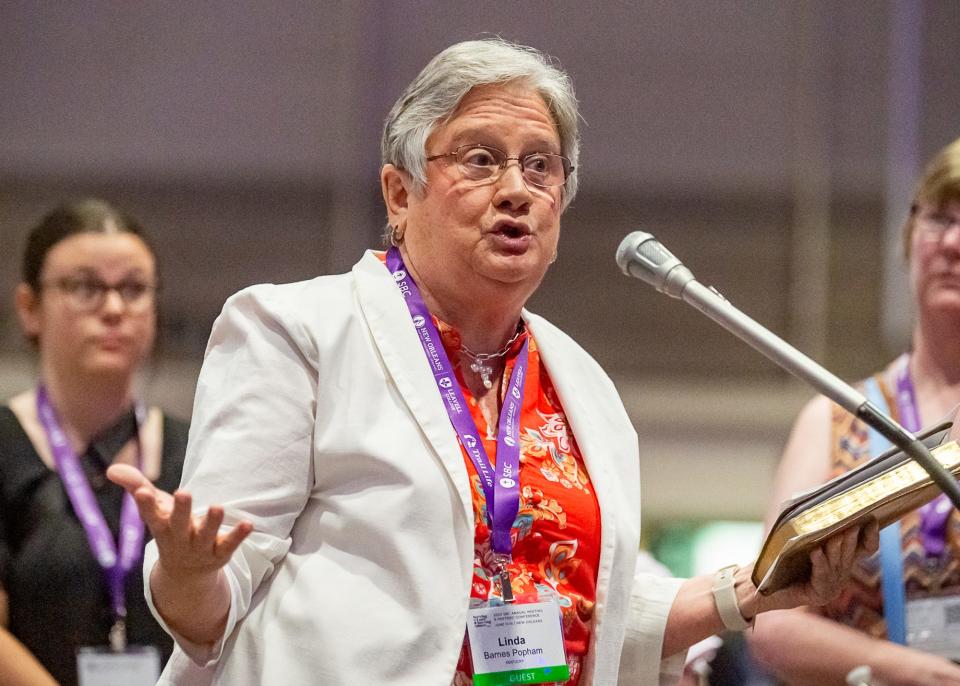
“They look at power sort of like a pie and they’ve been eating 7/8 of the pie. When other people said, ‘We want our little 1/8 too,’ it feels like such a loss to them,” said Shaw, the Oregon State professor. “That then promotes the backlash because they’re trying to restore that sense of power that they have.”
The number of panels at SBC annual meetings has steadily decreased since 2018 and 2019, according to an analysis of news reports. Headed into this year’s annual meeting, there’s only one woman in the role of chair of an SBC committee, trustee board or convention office.
SBC President Bart Barber has publicly acknowledged difficulty with recruiting women to appoint to the SBC Abuse Reform Implementation Task Force.
Compared to the high point of Litton’s election as registration secretary and that of other women to similar positions, Litton said, “we haven’t seen a lot of things happen since that time at that level.” Yet, Litton doesn’t see that as complete cause for alarm.
Through her work at the North American Mission Board, Litton is seeing more women involved in church planting, especially among minority-led churches. Also, she’s observed more women participating in the SBC annual meeting as messengers.
Bounds expressed a similar sense of encouragement, stipulating that a woman who leads a Vacation Bible School ministry is doing just as important work as a woman who chairs an entity trustee board. “The path is very open for females in leadership,” Bounds said.
But to DeMuth, that path is one that Southern Baptist women traversed before.
“Every inch of ground you regain is ground you’ve already gained before,” said DeMuth, drawing from an analogy of 19th century westward expansion in the U.S. Regardless of what happens to the Law Amendment in a matter of weeks, an arduous journey awaits.
“You have to pull up your stakes and re-pioneer, and that is what women in that space in the SBC are doing,” said DeMuth. “They’re having to regird and get ready to re-pioneer.”
Liam Adams covers religion for The Tennessean. Reach him at ladams@tennessean.com or on social media @liamsadams.
This article originally appeared on Nashville Tennessean: Southern Baptist Convention to vote on new rule barring women pastors
Signup bonus from




